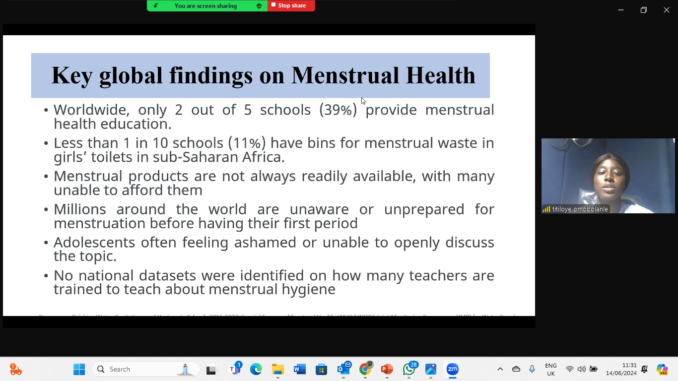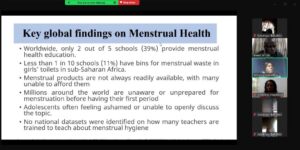
Omobolanle Titiloye edited by Babatope Babalobi
Bread of Life Development Foundation organised an online meeting to review the report of #WHO/#UNICEF Joint Monitoring Programme (JMP) for Water Supply, Sanitation and Hygiene (WASH)on Progress on Drinking Water, Sanitation, and Hygiene (#WASH) in Schools 2015-2023, Special Focus on #MenstrualHealth.
 The WHO/UNICEF report, released on May 27, 2024, sheds light on the challenges faced in ensuring adequate WASH facilities and addressing menstrual health issues in schools across the years.
The WHO/UNICEF report, released on May 27, 2024, sheds light on the challenges faced in ensuring adequate WASH facilities and addressing menstrual health issues in schools across the years.
Bread of Life organised the event to discuss and analyse the information gathered in the report to enhance understanding and drive positive change in Nigeria’s Water, Sanitation, and Hygiene (WASH) sector.
The virtual meeting was held on June 14, 2024, Via Zoom.
Participants
Fifty-five people registered for the meeting, but 30 participated. Some of the participants were:
- @Babalobi Babatope
- @Drolufemi Aluko, Senior lecturer, Environmental Health Unit, Department of Community Health, Obafemi Awolowo University, Ile Ife
- @ Sanmi Falobi
- @Timeyin Uwejamomere
- @Titiloye Omobolanle
- @ Kingsley Okla, an Independent WASH consultant
- @ Naanpet Polycarp Dashilip WASH Officer
- @Elizabeth Kah, Executive Director Journalists for Public Health and Development Initiative
- @Abiodun G. Faseluka, Monitoring and Evaluation Expert
- @Safiyanu Lawal Bichi, Member Technical Working Group WASH Policy Development, Kano State
- @Sunusi Garba Kano Rural Water and Sanitation Agency Monitoring and Evaluation (M&E) Manager
- @Ayodele Osalade, General Manager/ Head, Ekiti State Water and Sanitation Regulatory Agency (EK-WASRA) ·
- @Alimot Adekemi Balogun from Environmental Health Department Obafemi Awolowo Teaching Hospital
- @Nandak Nathaniel WASH Humanitarian Empowerment Initiative
- @Rabia Ibrahim Karaye Chief scientific officer, Kano State Water Board
- @Chidi Iheka from WASH Consultant
- @Peter Dare
- @Dorcas Kwamande
- @Victor Koreyo
- @Sarah Ode
- @Sobayo Mayowa
- @Omolara Eniayewun
- @Joy Aduroja
- Chidi Iheka, a WASH Consultant
The meeting commenced at 11. am and ended at 12:30 pm featuring presentations by the Bread of Life team led by its Executive Director- Dr Babatope Babalobi, and Programme Assistant- Titiloye Omobolanle, followed by contributions from participants as well as a question-and-answer session.
@DrBabatopeBabalobi’s presentation featured the following:
- Why the WHO/UNICEF JMP report is important
- Key Global Findings on WASH in Schools
- Key Findings on WASH in Schools in Nigeria
- Ideas for Advocacy
Babalobi said the report helps in monitoring Sustainable Development Goals #SDG targets related to WASH, which includes SDG 4, which aims to ensure inclusive and quality education for all; SDG 5, which aims to realise gender equality and empower all women and girls; and SDG 6 which aims to ensure the availability and sustainable management of water and sanitation for all.
He also said the report reflects on growing attention to the links between WASH and menstrual health and examines the availability of national data corresponding to internationally recommended priority indicators for girls’ menstrual health and hygiene.
He summarised the key statistics in the report that was made as follows:
Global overview:
- Access to drinking water: 447 million children (23%) do not have access to drinking water at school.
- Sanitation facilities: 427 million children (22%) do not have access to sanitation services that are single-sex and usable at school.
- Hygiene: 646 million children (33%) lack a basic hygiene service at school
- Menstrual health management:
- Only 2 out of 5 schools (39%) provide menstrual health education.
- Less than 1 in 3 schools (31%) globally have bins for menstrual waste in girls’ toilets.
Nigeria’s Data:
- In 2023, 29 million Nigerian children still had no drinking water service at their schools.
- In 2023, 32 million Nigerian children still had no sanitation service at their schools.
- In 2023, 47m Nigerian children had no hygiene service in Schools
- Disparities were observed in basic sanitation, which ranged from 90% in Lagos to 9% in Gombe in Nigeria (81%) in 2021
- Fewer than half the schools in FCT (47%) had access to basic WASH in 2021
His presentation is accessible here:
Contributing, @OmobolanleTitiloye summarised the findings of the report on the following:
- Key findings on menstrual health
- Challenges of menstrual health in Nigeria
According to her, key global findings on menstrual health are the following:
- Worldwide, only 2 out of 5 schools (39%) provide menstrual health education.
- Less than 1 in 10 schools (11%) have bins for menstrual waste in girls’ toilets in sub-Saharan Africa.
- Menstrual products are not always readily available, and many are unable to afford them.
- Millions around the world are unaware or unprepared for menstruation before having their first period.
- Adolescents often feel ashamed or unable to discuss the topic openly.
- No national datasets were identified on how many teachers are trained to teach about menstrual hygiene.
Key findings on menstrual health in Nigeria are that only 3.8% of schools provide menstrual materials for free. Implies that 96% of pupils have to purchase these items.
Dr Olufemi Aluko shared a link to a study on menstrual hygiene management in secondary schools:
Discussions
The key discussions at the meeting are summarised below:
- There is a culture of silence around or surrounding menstruation, which, of course, we need to disabuse and see how we can take advocacy, awareness creation, and knowledge sharing to ensure that we are able to navigate this challenge as quickly as possible.
- Safe disposal of menstrual pads is still a major challenge among girls and women.
- Men and Boys should be involved in menstrual health to promote understanding, support, and break the stigma surrounding menstruation. It is essential for them to be educated about menstrual health to create a more inclusive and supportive environment for women and girls. By involving the male child in conversations about menstrual health, we can foster empathy, respect, and cooperation, leading to a more informed and supportive community for everyone.
- Regulators in the sector have a role to play in the economic regulatory of menstrual hygiene products, as well as in setting service standards and monitoring the quality of the products.
- Bread of Life was commended for organising the event to spread knowledge on menstrual hygiene issues.
#Globalhealth #WASHInSchools #HealthEquity #CommunityDevelopment #EducationForAll #SDG6 #PublicHealth #Breadof Life Development Foundation @WHO @UNICEF
Leave a Reply